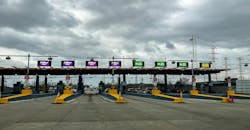Key takeaways:
- Indiana passed a bill that broadly enables it to implement interstate tolls pending FHWA approval.
- With the law, Indiana became the first state to authorize tolling for all its interstate routes.
- The law comes as regulators doubt the capabilities of the Highway Trust Fund’s fuel taxes to support surface transportation.
Indiana wants to toll its interstate highways to increase funding. The state in May passed House Bill 1461 into Public Law 173, which authorizes the state to request federal approval for tolls on any interstate route.
“If the department, with the approval of the governor, decides to establish toll lanes, the department shall submit a request to the Federal Highway Administration for a waiver to toll lanes on interstate highways,” the law’s text says. “If a waiver is granted under this section, the toll lanes may be established in accordance with this title.”
The law makes Indiana the first state to authorize tolling for all its interstate routes, which include well-traveled freight lanes such as Interstates 64, 65, 69, 70, 71, 80, and 90.
Governments are grappling with a deficient Highway Trust Fund. Improved fuel efficiency, outdated fuel tax rates, and rising electric vehicle populations all weaken the Highway Trust Fund’s ability to support interstate upkeep.
See also: Quiz: How well do you know Interstate System history?
“The current way we fund roads just does not work anymore,” State Senator Mike Crider told Axios. “The gas tax is not a viable method anymore. We have to leave all options on the table.”
Currently, 24 states, including Indiana, have interstate toll roads (not counting toll bridges and tunnels). The only tolled interstate in Indiana today is on I-80/90. The toll route utilizes EZ-Pass and charges trucks roughly 49 cents per vehicle-mile.
FHWA regularly approves states’ interstate tolling, making it likely Indiana will succeed in implementing tolls for at least some routes. One of the more infamous examples of FHWA-approved tolling this year was New York City’s congestion pricing, which had its approval revoked by the Trump administration.
About the Author
Jeremy Wolfe
Editor
Editor Jeremy Wolfe joined the FleetOwner team in February 2024. He graduated from the University of Wisconsin-Stevens Point with majors in English and Philosophy. He previously served as Editor for Endeavor Business Media's Water Group publications.

